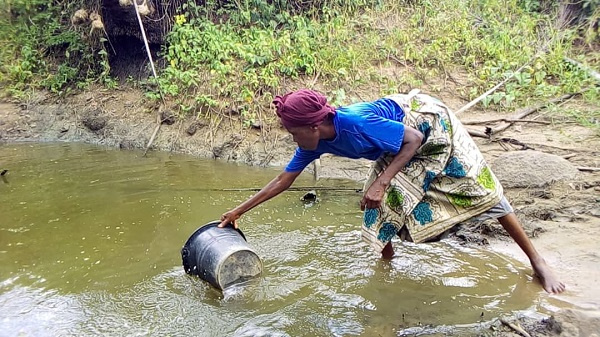Regional News of Wednesday, 9 June 2021
Source: www.ghanaweb.live
2021-06-09Suhum Municipal: Residents of Miawani who drink unclean water call for help
 Residents say that the Kwame Ntow stream is their only source of water
Residents say that the Kwame Ntow stream is their only source of water
Correspondence from Eastern Region
Residents of Miawani, a rural community in the Suhum Municipality of Eastern Region, have bemoaned that local authorities have neglected and left them to consume unclean water from the only stream in the community called “Kwame Ntow”.
According to the community members, for so many years, there has not been any potable water system constructed for them and therefore
Read full article.had no option than to rely solely on the dirty looking stream for its unclean water.
One of the women at Miawani who spoke to Ghanaweb said: “Pigs and other animals drink from this stream and we humans also drink from it because we do not have potable water here. We fetch it, go home and we have to boil it for three days before it can become safe for use."
“It is really stressful for us to get safe water from this dirty stream to drink. We get body itches and fall sick when we use it most of the time."
“Our children who use it also often fall ill. We appeal for help. The pollution is too high. It is we those in the village who grow food for the nation. How can we produce food for the nation when we fall sick as a result of unclean water?” she questioned.
Another woman, 66-year-old, voiced that during elections, the political parties are able to find their way into the Miawani community but never return there when they win power.
“It is true that the water we drink is very pathetic. We use it for all purposes. Humans and animals drink from it. We do not know the MCE. Ever since she was made MCE we have never seen her before. She has never stepped foot here."
Adding: “When we use the water to cook rice, you would think we soaked the rice in the mud before cooking. We develop various illnesses because of the water. They (politicians) are not coming here to help us but when it is time for election, they will find their way here. We appeal to them to come and help us. We ask local authorities to come to our help. We plead with the DCE to come to our help,” she said.

Augustine Bamson, a community secretary of Miawani, also expressed discomfort about the fact that the “Kwame Ntow” stream sits close to a cemetery and expressed fear that the water might be highly polluted by the remains of the dead who are buried in the cemetery.
“The water is called Kwame Ntow. It supplies the whole community. I get sad anytime I get here and see it. It is sad that in this 21st century, this is the water we drink. We appeal to the MCE to come and help construct a potable water system here for us."
“This is the water that even women use to wash their private places. Can you imagine what our women go through? I won’t talk much but I will appeal to the government and NGOs to come to our aid,” Bamson added.
The Sustainable Development Goal six (SDG6) enjoins nations including Ghana to ensure access to clean water and sanitation for their citizens.

Similarly, Article 29 of the Convention on the Rights of the Child states that “In the design of special measures, States parties should consider the needs of indigenous children who may face multiple facets of discrimination and also take into account the different situation of indigenous children in rural and urban situations...”
The lack of potable water in the Miawani community, apart from denying both children and adults clean water, seems to discriminate against the rural Miawani children whose peers in the urban areas in the same Suhum Municipality enjoy good drinking water.
Meanwhile, in an interview with the Municipal Chief Executive for Suhum, Margaret Darko-Darkwah, she acknowledged the challenges of the Miawani community and assured that it would soon benefit from on-going development projects within the Municipality.
“We started from somewhere and it will soon be their turn to have their fair share of projects. But when you go to those communities, advise them to participate in community durbars to lay bare their needs (during needs assessment). A number of times, durbars have been organised in their community but they preferred to go to the farm to participate in the community durbar."
“Recently we constructed their road for them. Did they talk about that? There is a lot we are doing and we shall soon get to them too,” she told Ghanaweb's McAnthony Dagyenga.















